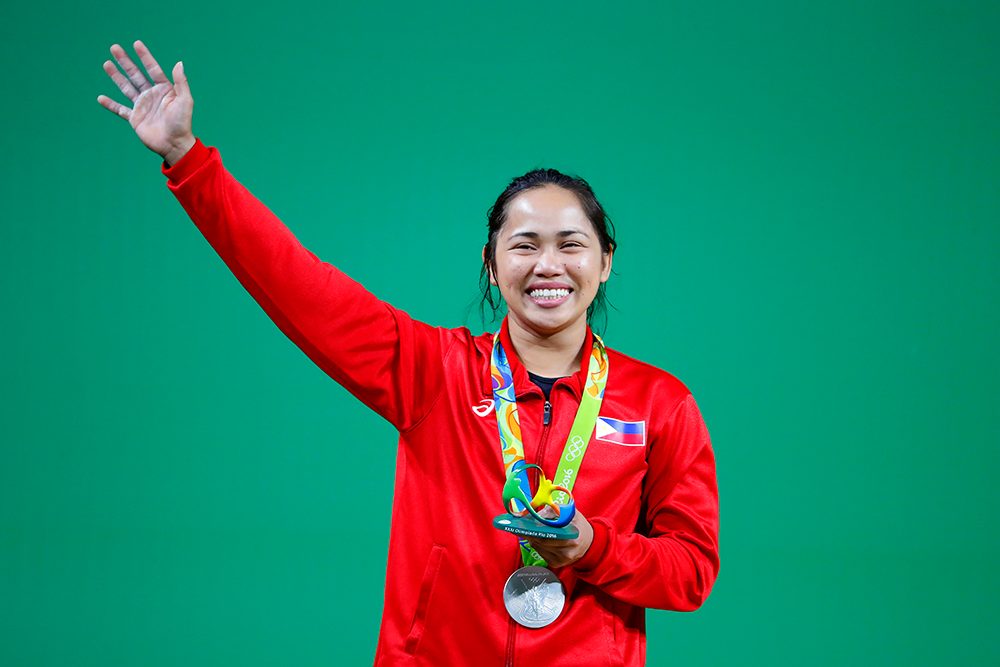SUMMARY
This is AI generated summarization, which may have errors. For context, always refer to the full article.

MANILA, Philippines – Former Philippine national team weightlifters were moved to tears by news that Hidilyn Diaz, a 25-year-old competing in the women’s 53-kg division, earned a silver medal in the wee hours of Monday morning, August 8 Manila time.
Noe Rinonos, 75, cried with joy when the radio reported that Diaz had won the Philippines’ first silver in 20 years at the Rio Olympics. Rinonos, one of the few Philippine Olympic weightlifters alive, said: “I cried when I heard the news and I thought of our teammates, now gone.”
Federico Ferrer, 77, a former Asian champion, was taking a bath and muttered who disturbed him. But when told Diaz won a silver, he exclaimed: “Wow!” Ferrer, an Asian champion in the 1960s, said the first Filipina to win an Olympic medal was “very lucky.” He said: “She felt discomfort in the clean and jerk. Then her Chinese rival failed to lift a heavier weight. She got silver.”
Rinonos and Ferrer were part of the golden era in the 1950s to1980s, when Salvador del Rosario became world champion in 1970. Diaz’s victory was a throwback to the eighth-place of the late featherweight Alberto Nogar at the 1960 Games in Rome.
That was when weightlifting and bodybuilding clubs sprouted in Manila highlighted by the 1974 World Weightlifting Championships in Manila where Vasily Alexeev of Russia, then the world’s strongest man, starred. Even the late President Ferdinand Marcos was a devotee of weightlifting.
But admirable was how 4 years ago Diaz failed to lift any weight in London and that she wanted to retire because of her injuries two years and half ago.
“But we slowly addressed each injury. We focused on slowly getting her technqiue back by dividing the entire lifting sequence,” said Jay Futalan, her strength and conditioning coach in a Facebook message to Rappler.com.
“She was able to regain her strength and power. She regained her strength and improved her lift by six kilos in a matter of two months,” said Futalan.
After their training in China with Nestor Colonia, the other lifter, “the discomfort came back and then just got fixed when she returned here en route to Rio,” said Futalan.
Futalan stayed here watching the event at home. It was not known why he was not sent to Rio by sports officials.
Diaz, now the “default savior of Philippine sports,” was described by Futalan as a “shy, driven and strong woman who just loves her country so much.” On her fingernails were painted the colors of the Philippine flag.
Ferrer, who officiates in athletics meets, said he didn’t expect this late blessing to them, the weightlifters of old who were the top athletes of their time and died in anonymity.
Foremost was del Rosario, who got the world title when 3 opponents were disqualified. He died a few years after his uncle, Rodrigo del Rosario, passed away in 2011. The elder del Rosario, one of the first weightlifting Olympians, held the world record in the press, one of the 3 parts of the sport including snatch and clean and jerk. The press was phased out in the 1960s, but it was his nephew who achieved greater fame.
The man who made this possible, Elpidio Dorotheo, died in 2014 in the US but was honored by the Philippine Sportswriters Association. Dorotheo, a former Mr Philippines, developed nearly all of the top weightlifters and later became deputy minister of sports under the Marcos administration.
During that time, the Philippines, through the jovial strongman Jaime Sebastian, was a top weightlifting nation in the region but new talents fell short of expectations. Ramon Solis, a retired Navy officer, was the last weightlifter of note, noted for his ability to lift 3 times his body weight.
When Diaz comes how, the parades and the plaudits will follow her. But will it take 20 more years to win another Olympic medal? – Rappler.com
Add a comment
How does this make you feel?
There are no comments yet. Add your comment to start the conversation.